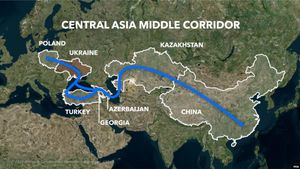China is becoming increasingly proactive on the global stage, especially evident in its recent efforts to engage with countries across Europe, Asia, and beyond, as well as strengthening partnerships, diversifying its diplomatic ties, and promoting its initiatives.
Take the case of Slovak Prime Minister Robert Fico, who recently embarked on a six-day visit to China—a trip laden with the potential to reshape Slovakia's foreign policy direction toward Beijing. Fico's visit includes pivotal meetings with Chinese leader Xi Jinping and significant participation at the China International Import Expo. Analysts interpret this visit as China's attempt to bolster ties with Fico, who possesses pro-China sentiments and has been quite vocal about his criticisms of EU's stances on sanctions against Russia and support for Ukraine.
Fico’s shift back to power after several hiatuses has prompted him to advocate for what his government calls an “all-azimuth” foreign policy. This umbrella term encompasses forging economic ties with any country without the usual political baggage, including human rights and security matters. His approach suggests a departure from Slovakia’s recent proactive stance toward Taiwan and is momentous, considering Fico's efforts to diminish Slovakia's alignment with Western Europe’s mainstream political ideology.
Critics note Fico's new chapter with China is economically driven. This is not just about ideology but about economic survival, particularly as Slovakia looks to recover economically amid sluggish growth. The Prime Minister aims to establish partnerships and attract investments beyond the continent, recognizing China, alongside Russia, as key players. This pivot is also indicative of Slovakia’s intertwined destiny with the global economic climate, especially as Fico seeks to leverage China’s investments to revive infrastructure projects back home, including roads, transport systems, and renewable energy projects.
Interestingly, Slovakia stands at the forefront of European car exports to China, with companies like Volkswagen playing pivotal roles. This forthcoming engagement reflects the balancing act Slovakia must perform between its EU commitments and the burgeoning relationship with China, raising the stakes for European policy as the bloc grapples with growing competition for investments.
Fico's moves are emblematic of a broader trend where countries, particularly those postured as geopolitical pawns amid US-China rivalry, are recalibrated their foreign policies. It is no secret China has been tapping its influence through economic diplomacy, creating conditions conducive for countries to forge ties without inclination toward Western critiques.
Further elucidation is found when examining the nature of US-China relations, which remain complex and rife with tension yet are underpinned by significant collaborative endeavors. Despite nationalistic tensions, scientific collaboration continues between these two powers, particularly focusing on areas like climate change and public health. This interdependence reveals how countries align or clash based on shared interests, even as they maneuver through geopolitical pressure.
According to studies, collaborative patterns have remained strong over the years, indicating efforts from both sides to prioritize joint initiatives aimed at sustainable development. US and Chinese researchers frequently collaborate on topics such as energy consumption and public health strategies, elements particularly pronounced post-COVID-19. Even in the face of suspicion and conflicting narratives surrounding topics like virus origins and vaccine development efforts, both nations still find common ground which worth exploring.
This narrative isn’t unique to Slovakia or even the US and China; it reflects a global milieu where nations seek alliances, partnerships, and opportunities without adhering strictly to historical norms or ideological constraints. Countries across Asia, Europe, and Africa are similarly searching for relations with China—intensifying interconnectedness as they look to access economic opportunities facilitated by initiatives like the Belt and Road Initiative (BRI). Countries have come to see the potential value of deepened engagements with China, whether through infrastructure development, scientific inquiry, or as trading partners armed with investments.
While the prospect of economic collaboration with China appears attractive to many states seeking recovery from the pandemic or economic downturns, it isn’t without risks. Critiques range from the potential for international debt traps to national security concerns as countries proceed with caution to navigate their relationships with the Chinese government. It’s becoming increasingly evident the balance of power continues to shift, and with China flexing its diplomatic muscle, it’s drawing interest not just from powerhouse nations but smaller countries needing support. This dichotomy of ambition and scrutiny creates conduits for new dynamics within global political and economic arenas.
Realistically, nations are responding to multifaceted challenges. For Slovakia, Fico’s envisioned partnerships with China, combined with economic diversification, could serve to stabilize the nation’s economic prospects, yet the political ramifications will require careful management to avoid backlash both locally and within broader European contexts. Meanwhile, on the larger canvas of international diplomacy, the intertwining of national interests with collaborative endeavors reflects an age where economic pragmatism often reigns supreme over historical allegiances.
China’s approach, whether perceived as benevolent or self-serving, continues reshaping global alliances, leaving many governments at the crossroads of choices. Such engagements embody the reality of modern diplomacy, where countries are adapting, reassessing, and often flipping the script to play new roles on the global stage.



